IAEA Concerned About Pace Of Cooperation With Iran
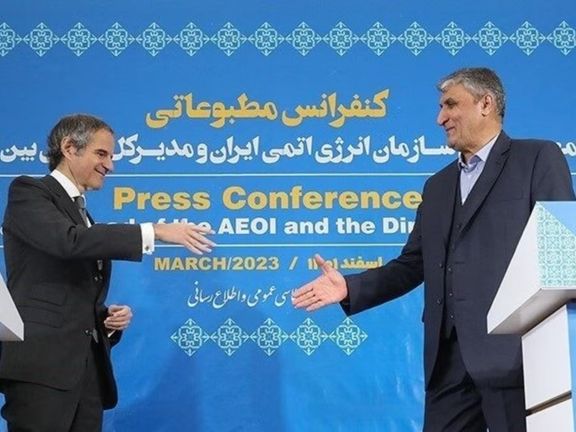
Head of United Nations' nuclear watchdog has raised concern about Iran's nuclear program and the regime’s sluggish cooperation with the agency.

Head of United Nations' nuclear watchdog has raised concern about Iran's nuclear program and the regime’s sluggish cooperation with the agency.
In an interview with France 24, the Director General of the International Atomic Energy Agency (IAEA) Rafael Grossi said, "Iran's continuing enrichment activities, it's raising concerns.”
Nevertheless, he said, "we agreed that Iran collaborates with the agency, limiting some activities, allowing us to add more monitoring capacities," adding however that “Our deal with them for more verification isn't working to the level and pace I would like to see."
Referring to an agreement he reached with Iran in March, Grossi said, “We have been able to do some of that, not all of that," he said, noting that “Iran in continuing its enrichment activities.”
Since the last time Grossi was in Iran and announced new agreements with the regime three months ago, Iran's stockpile of enriched uranium has increased by more than a quarter.
Earlier in June, Iran said it has reinstalled 10 cameras of the UN nuclear watchdog in one of its installations that were removed last year when the UN watchdog’s board of governors in June 2022 censured Tehran for its lack of cooperation with the agency.
Grossi also welcomed unconfirmed reports that US President Joe Biden’s administration seems to favor an informal and unwritten agreement with Tehran following the collapse of Vienna talks to restore the 2015 nuclear deal -- the Joint Comprehensive Plan of Action (JCPOA).
"I'm aware of bilateral contacts between Iran and the US... If there is any alternative kind of agreements, I hope we will be invited to verify that whatever commitments are taken are for real, and not just a piece of paper," he added.
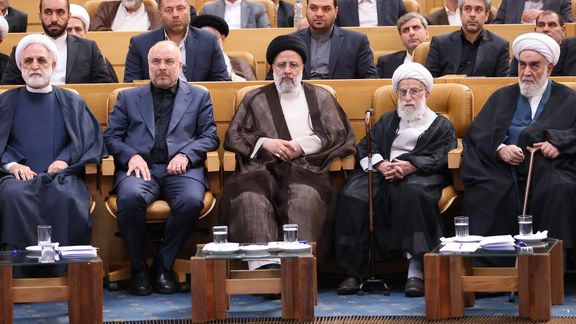
A reformist daily in Iran says the Interior Ministry's push to restrict lawmakers' activity in their constituencies was a move to further "purify" the political landscape.
Etemad wrote Tuesday, June 27, that the move by the office of deputy interior minister for political affairs was intended to help the ultraconservative Paydari Party members by making electoral competition harder for other candidates in the March 2014 elections.
The daily described the move as an initiative to disqualify all the government's critics even before the vetting by the Guardian Council.
Etemad quoted Hossein Jalali, a member of Paydari Party, as saying that "the call made by Majles Speaker Mohammad Bagher Ghalibaf and some of the lawmakers to remove deputy interior minister Mohammad Reza Gholamreza from his post was a kind of blackmail." Jalali added that the hardliners should not surrender to the lawmakers' excessive demands.
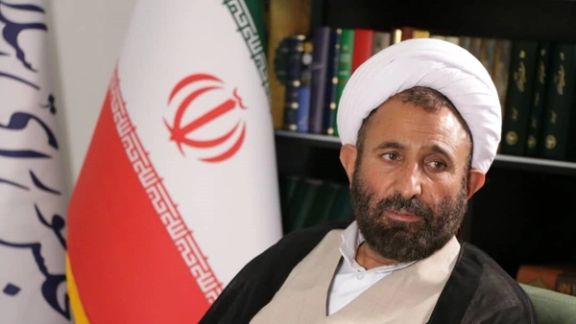
Independent and neo-con lawmakers who support Ghalibaf tabled the impeachment motion and the government feared that the parliament was not going to give a vote of confidence to the new agriculture minister. In this way, the government could lose two of its ministers.
Jalali was referring to the motion tabled by some lawmakers to impeach the interior minister if he refused to remove his deputy from his post. More than 200 lawmakers tabled a motion last week to impeach the interior minister. This was a vehement threat, as calls for impeachment are usually signed by between 20 to 40 lawmakers. At the time, the minister promised to remove his deputy as soon as possible.
According to Etemad, Paydari Party members tried to conceal "a major decision" that has been made in and out of the parliament about the next parliamentary election. Earlier, former Majles Speaker Ali Larijani had called the project "purification.” Some Iranian politicians believe that purification is Supreme Leader Ali Khamenei's idea to consolidate hardliners power in Iran.

Paydari, however, did not expect such a reaction by the parliament as some lawmakers even demanded an answer from President Raisi about the purification plan. Although the interior minister immediately nullified his deputy's statement, according to Etemad, lawmakers are adamant that Paydari has started a gamble over the plan and is not likely to stop it easily.
For the government, it is certainly a meaningful defeat that 100 of those who have called for impeachment of Raisi's Interior Minister come from among the 200 members of the parliament who invited Raisi to run for president in 2021.
Other moves elsewhere in the government indicate that the purification plan is being carried out forcefully across the establishment. A report by Etemad on Tuesday revealed widespread resistance against the purification plan that has been under way at the Iranian state TV where Vahid Jalili, the deputy chief of the state TV and a Paydari figure who is the brother of prominent hardliner politician Saeed Jalili, appointed several Paydari members to key posts at the television ahead of the parliamentary elections. Among the critics are current and former managers of the state television, Etemad wrote.
As a result of the state TV's management by Paydari hardliners, the broadcaster which holds the monopoly of broadcasting, has lost millions of its viewers who are not interested in the Paydari's propaganda. Etemad even quoted Culture Minister Esmaili as saying that "The state TV is losing its status as the nation's point of reference for news and information." Others had warned about the decline in the state TV and the government's social capital since the start of the nationwide protests in 2022.
Former President Hassan Rouhani has also called for putting the state TV at the disposal of the nation for at least two to three years to boost its reputation.
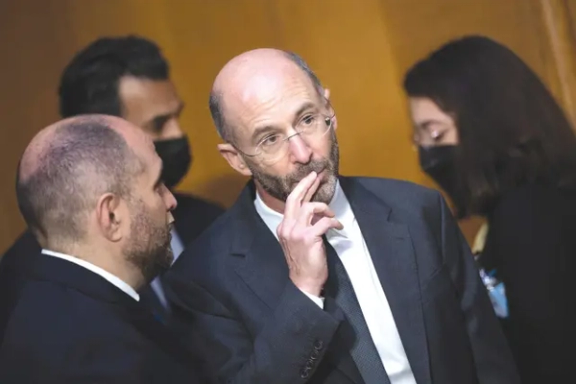
United Against Nuclear Iran, an advocacy group, has called for a Congressional investigation regarding lack of transparency by the White House over the suspension of US Iran envoy.
Robert Malley, who was appointed as Special US Envoy for Iran in early 2021 and conducted nuclear negotiations with Tehran has been suspended without pay, pending an investigation of his security clearance status.
“It is imperative that the Biden administration disclose how long it has withheld from Congress that consequential diplomatic engagements have been led by someone other than Mr. Malley and when the alleged mishandling of classified information took place, a statement issued Friday by UANI said.
Malley was apparently “on leave” at least since the beginning of May, but the administration never disclosed the real reason for his absence as it was holding indirect talks with Iran.
Malley was one of the architects of the controversial 2015 JCPOA nuclear deal with Iran and was also an advisor to President Barack Obama.
“Congress must investigate whether any misconduct colored Mr. Malley’s counsel to President Obama, President Biden, or both. Further, as a co-equal branch of government, Congress must insist that President Biden comply with federal law and afford it the opportunity to review and approve any agreement or so-called ‘understanding’ with the Islamic Republic over its nuclear program,” UANI added.
Many lawmakers in the US Senate and House of Representatives have voiced concern over reports about the Biden administration planning to make an interim and limited deal with Iran in unwritten form to avoid Congressional review.
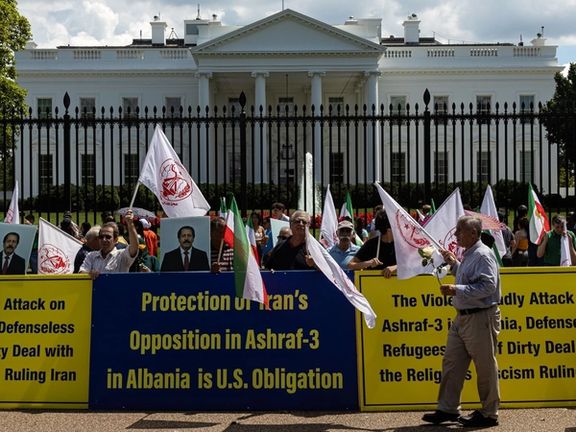
A Paris court on Friday reversed a decision by the French capital's police to ban an upcoming rally of an Iranian opposition group, the Mojahedin Khalq.
The court dismissed the police argument of the rally posing a risk of an attack, saying it interfered with the basic freedom to protest.
The ruling by the Paris administrative tribunal comes as police are fully stretched amid the worst riots seen across cities in France since 2005 sparked by the fatal police shooting of a teenager.
The Paris-based National Council of Resistance of Iran (NCRI), political arm of the People's Mujahideen Organization of Iran (PMOI), has held frequent rallies in the French capital over the years. They have attracted thousands of followers and are often attended by high profile former US, European and Arab officials critical of the Islamic Republic.
In a letter signed by Paris police chief on June 15 said it could not allow the protest because of security concerns.
That ban came just days after the release of an Iranian diplomat convicted of masterminding a plot to bomb the group in 2018 and as Western powers seek to defuse tensions with Iran.
The court said the ban "excessively violated the fundamental freedom to demonstrate". The rally will now take place near the French Foreign Ministry in central Paris on Saturday, for a limited period and be confined to one area. The protesters will also provide extra private security, the court said.
In a statement the NCRI welcomed the ruling, which it said denied Iran "the opportunity to exploit 'security concerns' under false pretenses in order to suppress democracy and freedom of expression."
Report by Reuters

Iran has rejected the voracity of a video released by Israel's spy agency Mossad of a captured IRGC agent caught before an attack on Jews and Israelis in Cyprus.
Nour News, affiliated to the Supreme National Security Council (SNSC), said in a tweet on Friday that the report was an effort to cover up Israel’s own domestic crisis, trying to cover up the shameful incident in which Mossad agents captured the assassin on Iranian soil.
The video of the captured agent was released on Thursday, in which the agent, identified as Yousef Shahabazi Abbasalilo, is filmed sharing details of his entry to Cyprus through the Turkish occupied north and how he had scoped out the location of the first target for assassination, prepared the weapon and concealed it on word that he must flee just days ago.
"The Zionist regime, which is (facing a) deterioration of its domestic situation, has narrated a failed operation from a year ago in Iran where all its agents were arrested in an upside-down manner," said Nour News.
Cypriot security forces dismantled the plot's infrastructure based on the information.
“We’ll get to every person that advances terrorism against Jews and Israelis all over the world, including on Iranian soil,” a senior Mossad official said.
Last year, Mossad captured a senior IRGC official on Iranian soil and interrogated him about weapons shipments to Iran's proxies.
This is the third time evidence emerges of Israeli agents detaining an IRGC operative inside Iran and taping confessions. A short audio recording was published by Israeli media in May last year with a photo of a man introduced as Iranian national Mansour Rasouli, 52.
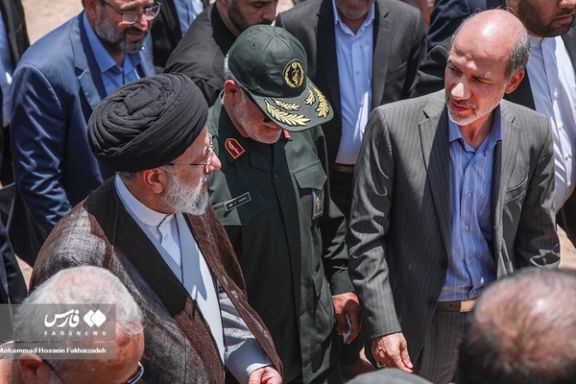
Ten thousand villages in Iran are without drinking water, with about 670 people in Kerman province facing “serious” water scarcity.
The Iranian energy minister Ali-Akbar Mehrabian, who is accompanying President Ebrahim Raisi in his trip to the central province of Kerman, made the remarks as residents of a large number of cities in the province are procuring water via water tankers stationed around the towns while the weather temperature is over 40 degrees Celsius (104 in Fahrenheit scale).
He claimed that the drinking water problem has been elevated in 3,000 villages and the issue will be resolved in the 10,000 remaining villages by the end of this Iranian year (March 19, 2024).
Iran has huge numbers of villages in remote rural areas who depend on support for survival. Although on decline, the rural population is roughly about 21 million people, a little less than a fourth of the country's population.
During his trip to the province, Raisi also inaugurated several water projects, which he promised would solve the problem in Kerman.
Water issues have been the main topic of Raisi’s visits to Iranian provinces in recent months, taking him to Sistan-Baluchestan and Khuzestan provinces that have very little clean water and temperature as high as 51 degrees (about 124 in Fahrenheit).
Earlier in June, the water was also out in the capital Tehran for several days with tankers distributing water to residents.
In January, CEO of Iran Water and Wastewater Company, Atabak Jafari, issued a warning saying that 270 cities and towns are suffering from acute water shortage as water levels at dams have dropped to critically low levels.
As drought persists across Iran, more underground water is exploited for irrigation, depleting natural reservoirs formed during thousands of years. Old and unregulated irrigation methods, as well as an aging urban water distribution infrastructure compound the shortage.
An inefficient agricultural sector, overgrazing of rangelands and forests, aggressive over-extraction of groundwater resources, and most importantly the regime’s mismanagement are among the main causes of water bankruptcy in Iran.